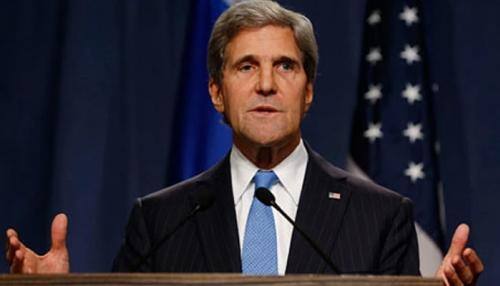- News>
- World
John Kerry on mission to reassure nervous Central Asia

The Central Asian economy has already taken a hit from falling oil prices and the knock-on effect of international sanctions against their former Soviet master Russia.
Vienna: Secretary of State John Kerry jets into Central Asia on Saturday for a five-day, five-nation tour of the "Stans" - to reassure them they will not be forgotten.
Concern is mounting in the region that, as the US operation in Afghanistan finally draws towards a close, Washington will lose interest in its landlocked northern neighbours.
The Central Asian economy has already taken a hit from falling oil prices and the knock-on effect of international sanctions against their former Soviet master Russia.
And now the Islamic State jihadist group is recruiting fighters from the region - including a US-trained special police chief - raising the spectre of extremist violence.
Senior US officials see Kerry's visit to Kyrgyzstan, Uzbekistan, Kazakhstan, Tajikistan and Turkmenistan as "very timely" as the region seeks outside reassurance.
But Washington also has concerns that the young republics, never paragons of freedom, may overreact to the crisis and crack down further on their own populations.
This in turn could provoke religious violence in the mainly Muslim region of the kind that has dragged nearby Pakistan and Afghanistan into violent conflict.
In Tajikistan, for example, President Emomali Rahmon's regime banned the main opposition party and jailed many of its leaders, accusing them of fomenting Islamist extremism.
"I don't know how much that was because of fear and a threat and how much it was a consolidation of power," a senior US official told reporters just ahead of the visit.
"Certainly I think there's probably some playing up of those anxieties by some quarters."
Central Asia researcher Edward Lemon, of Exeter University, who has studied Islamic radicalisation in Tajikistan and the broader region, goes further.
"I think the danger posed by the Islamic State is in fact less than the danger posed by the regime," he told AFP, warning that persecution provokes radicalism.
"There's this kind of Soviet system of close regulation of religious practices and that's more likely to cause people to turn to resort to violence and rebel against the state."
Certainly, the Islamic State group recruits Central Asians - US officials estimate 500 to 600 Tajiks have joined and Kazakh officials say 200 of their citizens are in Syria.
But both the US official and the British expert said that most of these were radicalised and recruited while working in Russia and that there is little danger so far at home.
